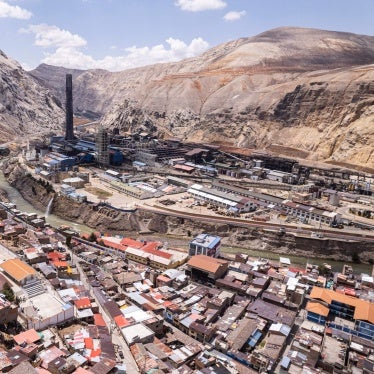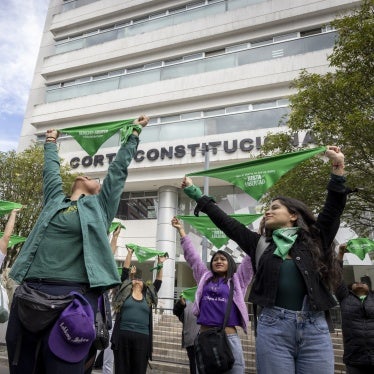A person who is arrested has a right to be brought promptly before a judge. This is a longstanding and fundamental principle of international law, crucial for ensuring that the person’s arrest, treatment, and any ongoing detention are lawful.
Yet, until now, Brazil has not respected this right. Detainees often go months before seeing a judge. For instance, in São Paulo state, which houses 37 percent of Brazil’s total prison population, most detainees are not brought before a judge for at least three months. The risk of ill-treatment is often highest during the initial stages of detention, when police are questioning a suspect. The delay makes detainees more vulnerable to torture and other serious forms of mistreatment by abusive police officers.
In 2012, the UN Subcommittee on Prevention of Torture and Other Cruel, Inhuman or Degrading Treatment or Punishment reported that it had received “repeated and consistent accounts of torture and ill-treatment” in São Paulo and other Brazilian states, “committed by, in particular, the military and civil police.” The torture had allegedly occurred in police custody or at the moment of arrest, on the street, inside private homes, or in hidden outdoor areas, and was described as “gratuitous violence, as a form of punishment, to extract confessions, and as a means of extortion.”
In addition to violating the rights of detainees, these abusive practices make it more difficult for the police to establish the kind of public trust that is often crucial for effective crime control. These practices undermine legitimate efforts to promote public security and curb violent crime, and thus have a negative impact on Brazilian society as a whole.
The right to be brought before a judge without unnecessary delay is enshrined in treaties long ago ratified by Brazil, including the International Covenant on Civil and Political Rights (ICCPR) and the American Convention on Human Rights. The United Nations Human Rights Committee, which is responsible for interpreting the ICCPR, has determined that the delay between the arrest of an accused and the time before he is brought before a judicial authority “should not exceed a few days,” even during states of emergency. The Inter-American Court of Human Rights, in the Castillo-Páezcase, ruled that the American Convention and the Constitution of Peru had been violated when a detainee in Peru was not brought before a competent court within 24 hours, as the Peruvian Constitution required.
Other countries in Latin America have incorporated this right into their domestic law. For instance, in Argentina, the federal Criminal Procedure Code requires that in cases of arrest without a judicial order, the detainee must be brought to a competent judicial authority within six hours.
In Chile, the Criminal Procedure Code requires that in cases of flagrancia -- in which a person is arrested in the course of committing a criminal act, the detainee must be presented within 12 hours to a prosecutor, who must either release him or bring him before a judge within 24 hours of the arrest.
In Colombia, the Criminal Procedure Code provides that in cases of flagrancia, the detainee must be brought before a judge within 36 hours. In Mexico, for most types of crimes, people detained in flagrancia must be handed over immediately to prosecutors, who then have to present suspects before a judge within 48 hours or else release them.
In many of these jurisdictions, the domestic legislation also requires promptly bringing detainees arrested following a judicial order before a judge. The Mexican Constitution, for instance, establishes that the authority that executes the judicial order of apprehension shall bring the suspect before a judge “without delay and under their strictest responsibility.”
Similarly, in Chile, detainees arrested following a judicial order must be brought immediately before the judge who ordered the arrest. If this is impossible, the detainee can be kept under police custody for only up to 24 hours. In Colombia, the Criminal Procedure Code also states that in cases of arrest with a judicial order, the detainee shall be put “at the disposal” of a judge within 36 hours. These protections have not eliminated abuse in detention in these countries, but they are a necessary part of long-term efforts to curb such violations.
In contrast, Brazil’s criminal procedure code requires that when an adult is arrested in flagrancia and held in police custody, only the police files of the case need to be presented to the judge within 24 hours, not the actual detainee. Judges evaluate the legality of the arrest and make the decision about whether to order continued detention or other precautionary measures based solely on the written documents provided by the police.
The code establishes a maximum of 60 days for the first judicial hearing with the detainee, but does not explicitly say when this period begins. In practice, this often means that police in Brazil can keep people detained, with formal judicial authorization, for several months, without giving the detainee a chance to actually see a judge.
According to the code, the only circumstance in which police need to bring a person before the judge immediately applies to cases of crimes not subject to bail in which arresting officer was not able to exhibit the arrest order to the person arrested at the time of arrest. Otherwise, the detainee may also not see a judge for several months.
Since 2011, legislators in Brazil have been debating a draft law that would reform the criminal procedure code to establish a mandatory “custody hearing” before a judge within 24 hours of arrest with the detainee present. These mandatory custody hearings would, besides enabling immediateanalysis of the legality of detention,allow detainees arrested in flagrancia who were subjected to torture or other mistreatment to denounce these abuses at the outset of the legal process. This in turn would enable justice officials to investigate allegations of abuse while corroborating evidence is still available. Unfortunately the reform would leave the situation unchanged for the smaller number of people arrested under a judicial order.
It is unjustifiable that a democracy like Brazil has disregarded this fundamental right for so long. This reform cannot, by itself, solve the problem of abusive police practices in Brazil, and will still leave some detainees without the right to see a judge, a gap that the Congress should also address. However, the draft law is a crucial step for curbing the mistreatment of detainees and ensuring that Brazil’s police forces operate in a more transparent, professional, and effective manner.







